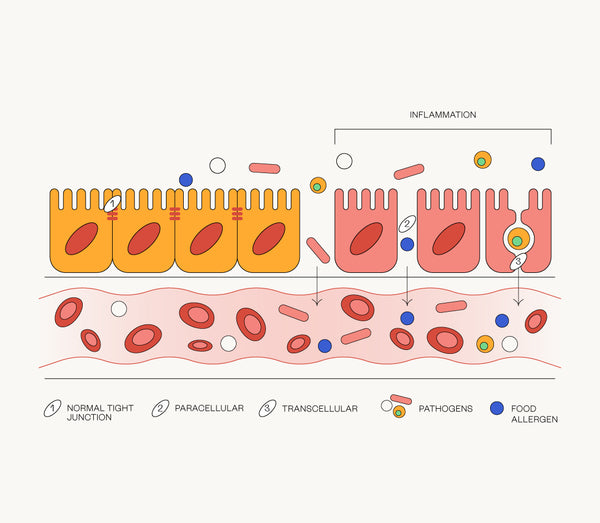How Quickly Can I Improve My Gut Bacteria?
A healthy, diverse gut microbiome is linked with various health benefits like better digestion, improved immunity and lower rates of heart disease, depression, IBS and allergies. But how quickly can you boost your gut bacteria and improve this microenvironment?
The gut microbiome in 30 seconds
Your gastrointestinal tract is teeming with culture, and by that we mean microbes! That’s right, your gut is home to a complete ecological community that you probably didn’t realise existed until recently.
You might think that your body is simply yours, but it’s not. You share it with trillions of microbes. So many in fact, that there are more bacteria than human cells in and on you [1]. That includes within your gastrointestinal (GI) tract.
Think of your gut like a 5* hotel for bacteria (and yeast, viruses, archaea etc). By giving them somewhere to stay and eat, they pay you in kind by completing some really useful jobs your body finds difficult to do, such as breaking down dietary fibre [2].
That’s not all, many diseases are thought to begin in the gut or be influenced by the processes initiated in the gut microbiome [3]. So, this micro-community is super important for your health and wellbeing. Put simply, a healthy gut = a healthy you!
Want to know even more about the gut microbiome? Have a look at our Gut Microbiome 101 page [LINK].
Can I really shape my own gut?
Yes - we are in control (mostly) of what our gut microbiome looks like, the diversity of gut bacteria and their abundance. Lifestyle is a major factor in shaping the ecosystem in your gastrointestinal tract, especially diet.
But it works both ways. As much as your lifestyle can improve your gut microbiome, it can also negatively alter the diversity and composition, causing an imbalance - known as dysbiosis.
FACT BOX
Dysbiosis is where there is an imbalance between the microbes that make up your natural gut microflora. It is this which is believed to contribute to a range of illnesses and health conditions.
Some sources claim that the average person will eat a whopping 35 tons of food in their lifetime [4]. That’s a lot of food that your gastrointestinal tract comes into contact with, but it’s not just food. Your gut is also exposed to the following which can interfere with the microbiome composition:
- Medication e.g. antibiotics, prescription meds, painkillers
- Pathogenic/opportunistic microbes e.g. salmonella, listeria [5]
- Alcohol
- Environmental chemicals [6]
Shaping your gut microbiome so that it resembles something healthy isn’t achieved overnight. There is no quick fix. It takes time, effort and perseverance, but the payoff can be extraordinary. Making the extra effort today will benefit you tomorrow, looking after your gut is an investment in your future health. Trust us, we’re not kidding!
[H2] Improve your gut bacteria with these lifestyle changes
Remember your gut microbiome is individual to you, a bit like your fingerprints, it won’t look the same as somebody else’s. That’s because there are many factors which contribute to its overall composition, some will be within your control, others won’t
So, let’s have a look at some of the things you can do to promote the health of your gut - don’t worry they’re all pretty easy.
[H3] Diet - what you should eat to boost belly bacteria
Here goes, what is the most frequent passenger through the tube (or metro) line that is your gastrointestinal (GI) tract? Of course, it’s food. And food choices can have a major influence on what your gut microbiome looks like and ultimately, your overall health.
The western diet is a prime example. This dietary pattern is associated with both high rates of obesity and metabolic diseaseS like type 2 diabetes [7]. And guess what? The gut microbiome could be involved.
The western diet typically consists of:
- lots of red meat
- lots of animal fat
- refined sugar
- low amounts of fibre [8]
So, what can you do about it? Thankfully, quite a bit. To bag a belly-full of good bacteria, you’ll need to:
- Yogurt
- Kefir
- Kimchi
- Tempeh
- Sauerkraut
Overall, the best way to achieve a diverse community in your gut is to eat a whole range of foods, plenty of whole foods like fruit, veg, wholegrains, nuts, beans and legumes are perfect! Try experimenting with new foods and widen your horizons with a few fermented foods. They can have a depth of flavour, a new texture and might even turn out to be a new food fave!
Need a bit more inspiration? Check out our delicious recipe ideas and why not share your attempts with us on Insta.
[H3] Keep on movin’
Get shakin’ that booty because believe it or not, exercise is good for your gut. Whether you’re a fitness freak or someone who likes to dance around the sitting room doing the Cha Cha Slide for half an hour everyday, just a little exercise can increase health-promoting bacteria.
Some of the benefits of exercise on the gut include:
- protecting against colon cancer, inflammatory bowel disease and diverticulosis
- reduce inflammation
- protect the integrity of the gut lining
- improves the Bacteroidetes-Firmicutes ratio
- aiding weight loss [15]
At present, most of these benefits have been seen in mice and animal models but there are emerging studies that show exercise has benefits for the human gut microbiome [16]. For now though, regularly participating in some moderate intensity exercise, such as the following, is good for you, your gut, and your overall physical and mental health:
- jogging
- running
- dancing
- swimming
- cycling.
[H3] Get some zzz’s
Sleep, for many of us, is a real luxury that we look forward to, especially after a long, hard day, but sometimes our sleep patterns can be poor. Perhaps because of stress, work pressure, illness or night shift work, but a lack of good quality sleep can have a negative effect on your gut microbiome [17].
Some research shows that a microbiome that is rich in bacteria such as Actinobacteria and Firmicutes which produce the neurotransmitter γ-aminobutyric acid (GABA) is associated with healthy sleep [18].
Want to know more about neurotransmitters? Head over to our Gut-Brain Axis mini-series [LINK].
That’s not all poor sleep is known to promote obesity and insulin resistance, factors which are believed to be associated with the microbes in the gut [19]. So, what can you do to ensure you get some good shut eye?
- Avoid screens at least an hour before bed (TV, mobile phone, computer)
- Go to bed at a regular time each night and wake up to an alarm in the morning
- Keep a dark, quiet and tidy bedroom
- Reserve your bedroom for sleep and sex
- Avoid a heavy meal and caffeine before bed
- Invest in some thick curtains or blinds to help reduce noise and light.
[H3] Anything else?
There are a few extra things you can do to give your gut microbiome a health kick, such as:
- Avoid over exposure to antibiotics, if you don’t need them don’t take them.
- Manage stress.
- Take care of your tummy when travelling - avoid ice and tap water abroad if you are told to, only eat thoroughly cooked meat etc.
[H3] Incorporate some Innate microscopic magic
At Innate Co. we want to help you make a macroscopic difference to your health using the microscopic magic that already exists inside you.
That’s why we’ve created a synbiotic packed with magical microbes that’s designed to reach your gut alive, via a natural, vegan-friendly transporting capsule. Plus, it also has the added benefit of containing a sugar-free prebiotic to help the live cultures thrive when they reach your gut alive.
Grab your monthly subscription here [LINK].
Live cultures can help to restore and improve the composition of your gut microbiome by introducing beneficial functions to the existing bacterial communities. In turn, this helps to lower inflammation in the gut and can help to relieve the symptoms of some intestinal diseases [20].
[H2] Conclusion
How quickly can you improve your gut bacteria? The simple answer to that is how long is a piece of string. There are many factors that influence the composition of the microbial ecosystem in your gastrointestinal tract.
But making small improvements to your lifestyle is well within your control and can help improve its diversity. Remember, if you take the time and effort to invest in your gut health now, you’ll reap the rewards as you get older!
[H2] Sources
[1] Gilbert, J., Blaser, M, J., Caporaso, J, G., Jannsson, J., Lynch, S, V and Knight, R. Current understanding of the human microbiome. Nat Med 24. https://doi.org/10.1038/nm.4517 (2018)
[2] Valdes, A, M., Walter, J., Segal, E and Spector, T. Role of the gut microbiota in nutrition and health. BMJ 361. https://doi.org/10.1136/bmj.k2179 (2018)
[3] Brody, H. The gut microbiome. Nature 577. doi: https://doi.org/10.1038/d41586-020-00194-2 (2020)
[4] Reference.com. Available at: https://www.reference.com/world-view/much-food-person-eat-lifetime-1015c822087dfa41 (2020)
[5] Pickard, J, M., Zeng, M, Y., Caruso, R & Núñez, G. Gut microbiota: role in pathogen colonization, immune responses and inflammatory disease. Immunol Rev 279. doi: 10.1111/imr.12567 (2018)
[6] Claus, S, P., Guillou, H & Ellero-Simatos, S. The gut microbiota: a major player in the toxicity of environmental pollutants. npj Biofilms and Microbiomes 2. (2016)
[7] Zinöcker, M, K & Lindseth, I, A. The Wester Diet-Microbiome-Host Interaction and Its Role in Metabolic Disease. Nutrients 10. doi: 10.3390/nu10030365 (2018)
[8] Hold, G, L. Western lifestyle: a ‘master’ manipulator of the intestinal microbiota? Gut. http://dx.doi.org/10.1136/gutjnl-2013-304969 (2013)
[9] Heiman, M, L & Greenway, F, L. A healthy gastrointestinal microbiome is dependent on dietary diversity. Mol Metab 5. doi: 10.1016/j.molmet.2016.02.005. (2016)
[10] Shinohara, K et al. Effect of apple intake on fecal microbiota and metabolites in humans. Anaerobe 16. doi: 10.1016/j.anaerobe.2010.03.005 (2010)
[11] Vendrame, S et al. Six-week consumption of a wild blueberry powder drink increases bifidobacteria in the human gut. J Agric Food Chem 28. doi: 10.1021/jf2028686. (2011)
[12] O’Callaghan, A & van Sinderen, D. Bifidobacteria and their role as members of the human gut microbiota. Frontiers in Microbiology 7. doi: 10.3389/fmicb.2016.00925 (2016)
[13] Ruiz-Ojeda, F, J et al. Effects of sweeteners on the gut microbiota: a review of experimental studies and clinical trials. Advances in Nutrition 10. https://doi.org/10.1093/advances/nmy037 (2019)
[14] Hemarajata, P & Versalovic, J. Effects of probiotics on gut microbiota: mechanisms of intestinal immunomodulation and neuromodulation. Therap Adv Gastroenterol 6. doi: 10.1177/1756283X12459294 (2013)
[15] Monda, V et al. Exercise modifies the gut microbiota with positive health benefits. Oxid Med Cell Longev. doi: 10.1155/2017/3831972 (2017)
[16] Tabone, M et al. The effect of acute moderate-intensity exercise on the serum and fecal metabolomes and the gut microbiota of cross-country endurance athletes. Scientific Reports 11. (2021)
[17] Nova Southeastern University. New study points to another possible correlation between sleep and overall good health: Your gut microbiome and quality sleep are interconnected. https://www.sciencedaily.com/releases/2019/10/191028164311.htm (2021)
[18] Smith, R, P et al. Gut microbiome diversity is associated with sleep physiology in humans. PLoS One 14. doi: 10.1371/journal.pone.0222394 (2019)
[19] Poroyko, V, A et al. Chronic sleep disruption alters gut microbiota, induces systemic and adipose tissue inflammation and insulin resistance in mice. Scientific Reports 6. (2016)
[20] Hemarajata, P & Versalovic, J. Effects of probiotics on gut microbiota: mechanisms of intestinal immunodulation and neuromodulation. Therap Adv Gastroeneterol 6. doi: 10.1177/1756283X12459294 (2013)


